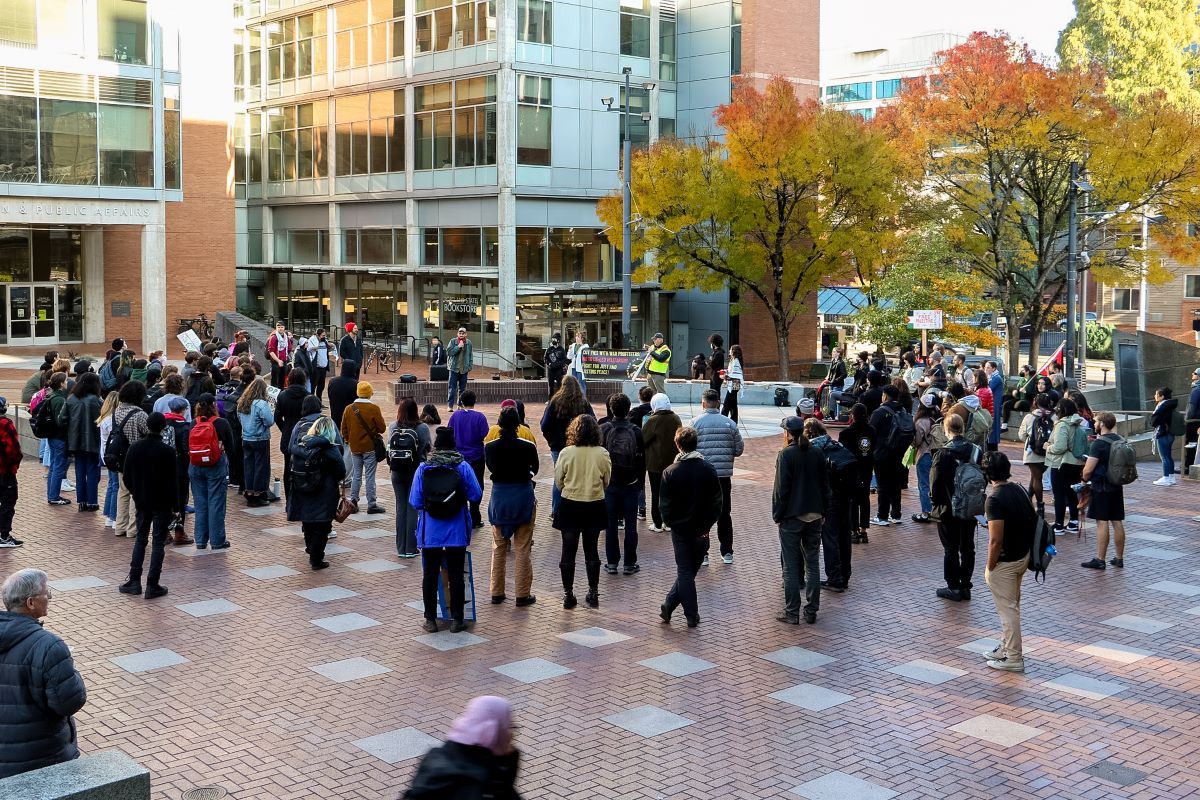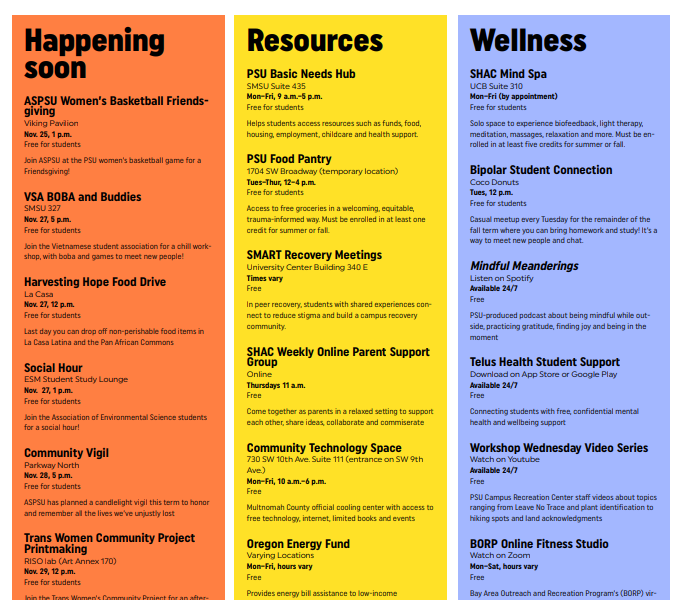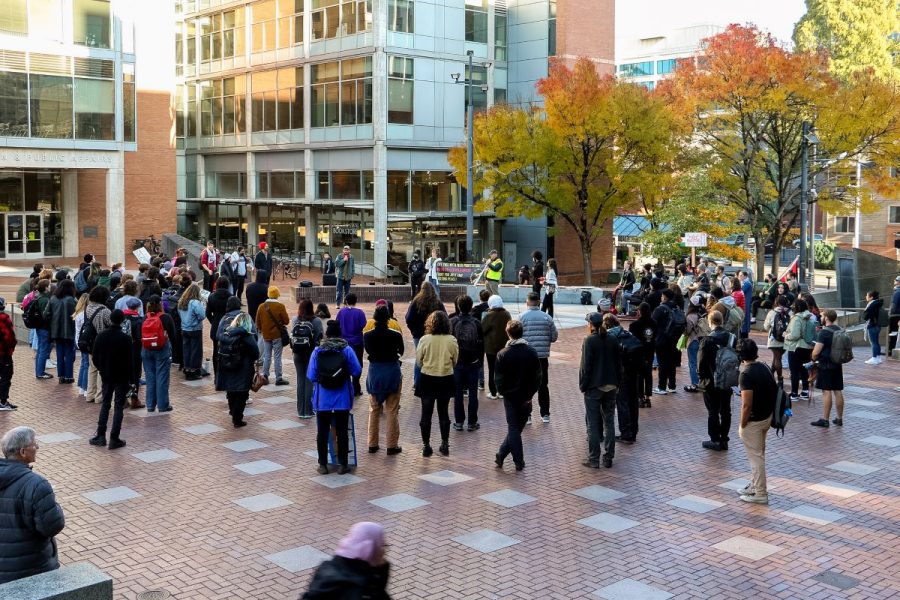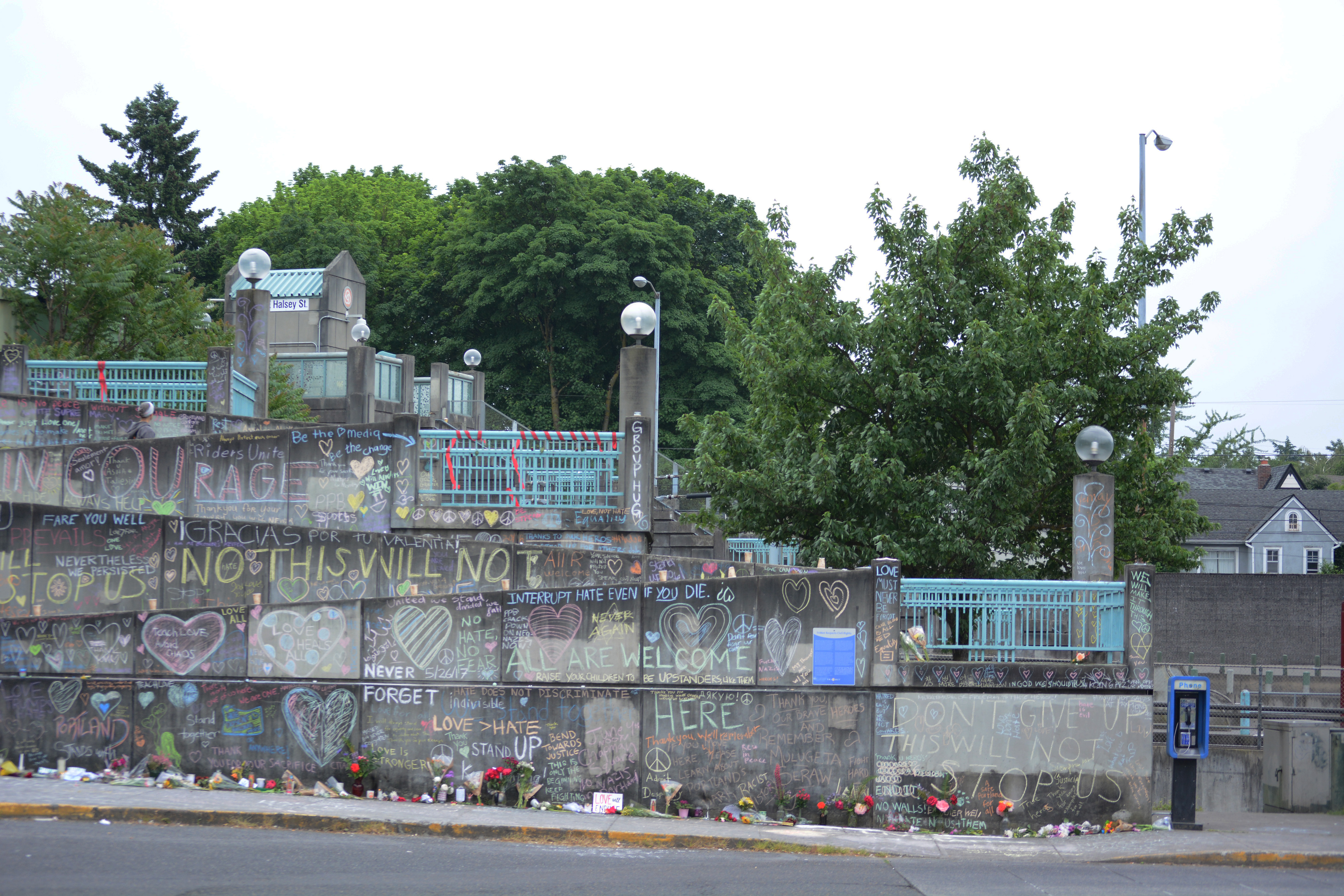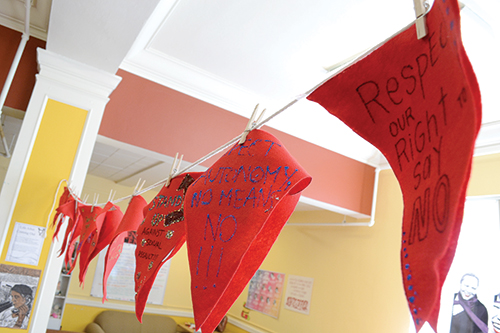On Wednesday, Nov. 8, Portland State students and members of organizations—including Students United for Palestinian Equal Rights (SUPER), the Resist United-States-Led War Movement and the Jewish Voice for Peace Portland—gathered in the Urban Plaza as part of a rally for the Cut Ties with Boeing campaign.
Protesters held the rally to express their objection to Portland State’s ongoing partnership with the weapons manufacturer Boeing. A recent opinion article for Portland State Vanguard cited PSU’s global undergraduate program, which stated that “PSU is one of only 13 Boeing supply chain focused universities, meaning that Boeing recruits PSU supply chain students every fall term.”
“PSU holds a ‘special recruiting and hiring relationship’ with Boeing, a major contributor to the PSU Foundation,” stated a flier handed out at the rally. “U.S. documented drone strikes alone have killed over 2,000 civilians since 2004 in Afghanistan, Somalia, Pakistan, and Yemen. Boeing is a key provider of fighter jets and bombs to the Israeli military in its assault on Gaza. Take Action against PSU’s complicity in war crimes!”
“The main goal of this rally was to spread a petition for a campaign for PSU to cut its ties with Boeing,” said Cody Urban, a member of the Resist U.S.-Led War Movement. “We’re calling for PSU to end it’s quote unquote special hiring relationship, end the program with the school of business, get rid of all of Boeing’s names across the campus and stop sending students into work for a company that—for especially many migrant students—is actually making bombs that are killing their families back home. That makes this campus ultimately not a safe place for those students.”
Shams is a member of the student-led organization SUPER, which works to educate people on Palestinian history and culture while fighting PSU’s connection with Boeing.
“Boeing is the world’s second largest arms manufacturer,” Shams said. “It funds the killing of people and destruction of countries. Not just Palestine—but notably Palestine right now—but also Iraq, Syria, Yemen, the Philippines and many more countries. It’s especially urgent for PSU to cut its ties with Boeing, because it has a special recruitment deal with the weapons manufacturing company, and it’s unlike any other university in that it has a recruitment deal with them, so I think PSU has a special interest in cutting ties with this war profiteering company.”
Shams said this is the third time they have fought against this partnership, explaining that they also took action in previous years to no avail.
In both 2016 and 2021, the Associated Students of Portland State University (ASPSU) passed a resolution calling for PSU to sever connections with organizations which profit from human rights violations against Palestinians. In 2021, ASPSU called on the PSU administration to cut ties with Boeing specifically.
Boeing produces helicopters, rockets, bombs, missiles and other military tools utilized by the U.S., Israel, Saudi Arabia and numerous other countries during times of war or other conflicts. A 2022 Vanguard article reported that “the raw materials required for Boeing’s products—such as aluminum, titanium, silicon, copper and cobalt—all often come from conflict zones, or regions of the world like the Democratic Republic of the Congo, where warring factions use the sale of these precious resources to fund genocide, slavery and other human rights abuses.”
Moreover, according to the United Nations, extracting such materials often leads to extreme environmental degradation in these regions.
Portland Mercury reported that, on Nov. 17, members of the Party for Socialism and Liberation (PSL) picketed Boeing’s plant in Gresham to protest the supplying of weapons to Israel during the current Israel-Palestine conflict.
The Seattle Times reported that, after the Oct. 7 Hamas’ attack which resulted in the deaths of approximately 1,200 people and 200 hostages, Boeing accelerated the delivery of 1,000 bombs to Israel.
However, according to the real news network, “Other testimony from survivors of Oct. 7 suggests an alternative explanation—that in its fervor to defeat Hamas, Israeli commanders may have willingly targeted and sacrificed Israeli soldiers and civilians in the crossfire,” stated the article.
On Nov. 25, Al Jazeera reported that over 14,800 Palestinians have been killed in Gaza since Oct. 7, including 6,150 children.
Shams, who is from Iraq, explained how they and other students feel uncomfortable with Boeing’s presence on campus.
“I don’t want to be a part of an institution [or] give my money to an institution that supports the killing and destruction of people back home—in my country, and countries that I’ve lived in, and countries I love with people that I love,” Shams said. “A lot of the student body here are from the Philippines. They’re from Syria. They’re from Iraq. They’re from Palestine. They’re from Yemen. They’re from Libya. They’re from so many different countries that Boeing profits off the destruction of, and they’re recruited to manufacture weapons that go and harm the people in their home countries, which is very sickening to think about. That’s why I think PSU has a special duty to cut ties with Boeing.”
In a recent press conference with Vanguard, PSU President Ann Cudd explained how the university has no direct investments in Boeing and owns no stock in the company, but that PSU is the recipient of donations of time and money from the company.
“We have hundreds of alums who work for Boeing, and they donated money to name a classroom in the business school, so [that is] how we have benefited from our relationship with them,” Cudd said. “I suppose cutting ties would cut off future benefits… I will never be in a situation where I will sell out the university for some donation. There is no donation that is worth our integrity, our reputation and our values, but things are complicated.”
Cudd explained how many factors play into how institutions accept donations. In particular, the questions which frame which companies’ donations are welcome include whether or not the company is violating any laws or the institution’s values, and if its support is essential to pursuing an academic or educational research mission for faculty and students.
“I think it’s important to maintain a pretty politically-neutral stance in accepting that so as not to chill the free speech and academic freedom of various members of our community,” Cudd said.
Shams explained how PSU gains financial benefits from its association with Boeing, especially as Boeing recruits many students who secure jobs soon after graduating. Shams said this relationship gives PSU leverage and benefits the institution entirely.
“PSU claims that it has a very diverse student body—that it takes care of its students—but, again, it does not,” Shams said. “It has shown us repeatedly that it does not. Whether it’s with arming the campus security here, whether it’s Boeing, whether it’s ignoring the calls for better housing—there’re so many different issues that PSU routinely ignores or pushes under the rug. When it comes out, it’s really ugly, because it’s been suppressed for so long, and it’s not brought up until there’s a boiling point… when people can’t ignore it anymore.”

